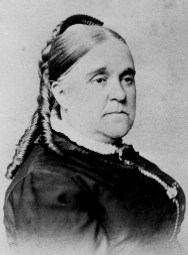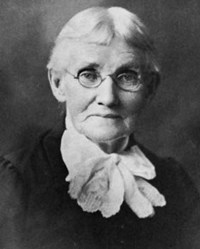

Sherman looked at the doctor and said, „Oh well then. If it was she, I can’t help you. She has more power than I … she outranks me!”
Every March, the nation celebrates women’s history month and remembers the women who helped shape this country, but their great accomplishments to the nation should be recognized outside of an allotted 31 days, said Col. Alicia Tate-Nadeau, of Delavan, Chief of Joint Staff and the highest ranking female officer in the Illinois Army National Guard.
„Not only did women have unequal rights in comparison to men, but most women were not paid for their efforts in the war,” said Tate-Nadeau. „I think that tells a lot about their dedication to the Soldiers and their country.”
As April marks the 150th anniversary of the Civil War, women are notoriously forgotten in the history books as being part of the conflict. Two distinct personalities come to mind from the history of the Illinois National Guard during the Civil War period: Mother Bickerdyke and Aunt Lizzie.
Aunt Lizzie joined a women’s group that travelled and provided comfort to the sick and wounded during the Civil War. In those camps, Aunt Lizzie helped Union Soldiers as a Civil War nurse.
Bickerdyke was born Mary Ann Ball in Mount Vernon, Ohio. At a young age, her parents and grandparents passed away, leaving her to be raised by her aunt and uncle. Mary attended Oberlin College and moved to Cincinnati.
She worked at a local hospital and married Robert Bickerdyke. Together they had three children; only their two sons survived past age 2. In 1856, the family moved to Galesburg where Robert soon passed away. She worked as a laundress, nurse and housekeeper to support her family. One Sunday at church, a pastor stressed the need for nurses in the Union Army hospitals. That is when Mother Bickerdyke found her calling as a Civil War nurse.
Aunt Lizzie was born Eliza N. Atherton. Born in Auburn, N.Y., and spent much of her childhood in the New England area. Lizzie spent a lot of her time doing missionary work with the Cavendish Church. In 1837, she married Cyrus Aiken and moved to Grand de Tour.
After a series of unfortunate events, Lizzie settled in Peoria. In 1861, the Civil War broke out and camps were established outside of Peoria that housed the ill and injured Soldiers. She joined a women’s group that traveled and provided comfort to the sick and wounded. In those camps, Aunt Lizzie discovered her passion to help Union Soldiers.

Mother Bickerdyke knew that better living conditions would lead to a longer life. Over the duration of the war, she was matron of several hospitals. She worked as a nurse, laundress and a cook. She had an unusually caring attitude, although sometimes that caring attitude came off pretty vicious. Many doctors complained about her, but „her boys” loved her. One of „her boys” was Sherman.
Sherman knew the love Mother Bickerdyke had for the Soldiers under her care and, let her do things her way. She was reported to have been present through at least 19 battles and was the only woman allowed in Sherman’s encampments.
Mother Bickerdyke a Civil War nurse, knew better living conditions would lead to a longer life.
Over the duration of the war, she was matron of several hospitals.
The need for compassion was quite obvious to all who encountered the Union hospitals. The sick men were often left unattended, due to understaffed nurses. The nurses did all they could, but was many times was not enough. Men died by the hundreds in the hospitals, until Aunt Lizzie came around. Aunt Lizzie provided support to the sick and injured Union Soldiers.
She not only used knowledge of nursing, but she used the compassion she learned at a young age to inspire others. She provided comfort to dying Soldiers and hope to the gravely injured. She traveled mostly with the 6th Illinois Cavalry.
In Shawneetown, Lizzie wrote, „…All join in saying we excel all other hospitals in being attentive to our sick and in cleanliness.”
Lizzie had so much compassion for the Soldiers, they endearingly gave her the name „Aunt Lizzie.” She was often asked to pass on messages to loved ones from dying Soldiers. That alone was satisfactory to her, that she was trusted enough to leave messages with families.
Both women commanded positive changes through imperious attitudes. Headstrong, yet compassionate, they cared deeply for their „boys.” These women traveled with the troops and displayed raw courage by putting themselves in harm’s way.
They were the 'women behind the curtain,’ or tent flap, of the hospital, devoid of the celebratory festivities of victory while working tirelessly to save lives. Their mission entailed helping out when needed, to care for the sick and wounded, to make conditions better for the Soldiers, and to ultimately help the North win the Civil War.
Mother Bickerdyke and Aunt Lizzie, saved many lives through sanitation and pressing labor. They helped pave the way for the generations of women who came after them. Their actions, even without a uniform, were a great service to the Union forces and its Soldiers during a major war in American history.
Tate-Nadeau said these women broke away from the expected roles of women in society and lived a life helping Soldiers during a conflict.
„While it’s only recently that women have been allowed to wear a uniform, but they have served and supported the military since the start of our nation,” said Tate-Nadeau.
Story by Pfc. Jami Prichard, Illinois National Guard Historian
